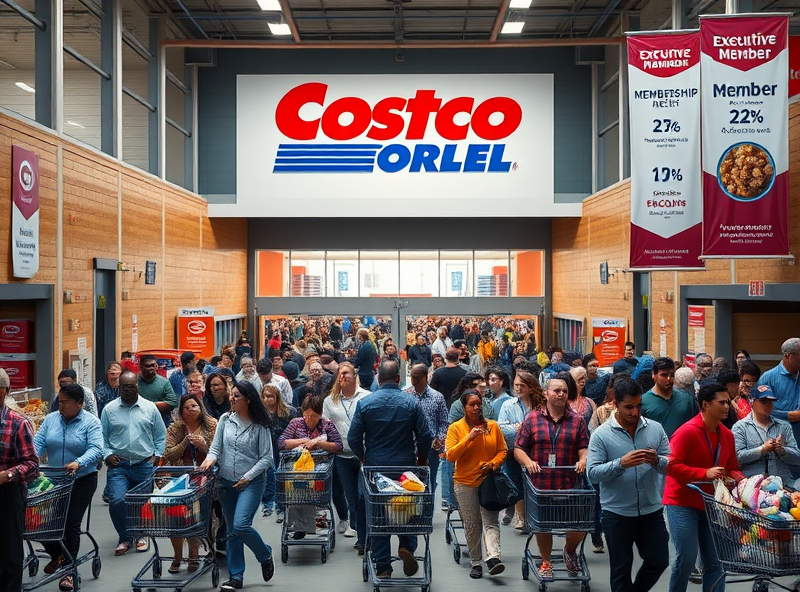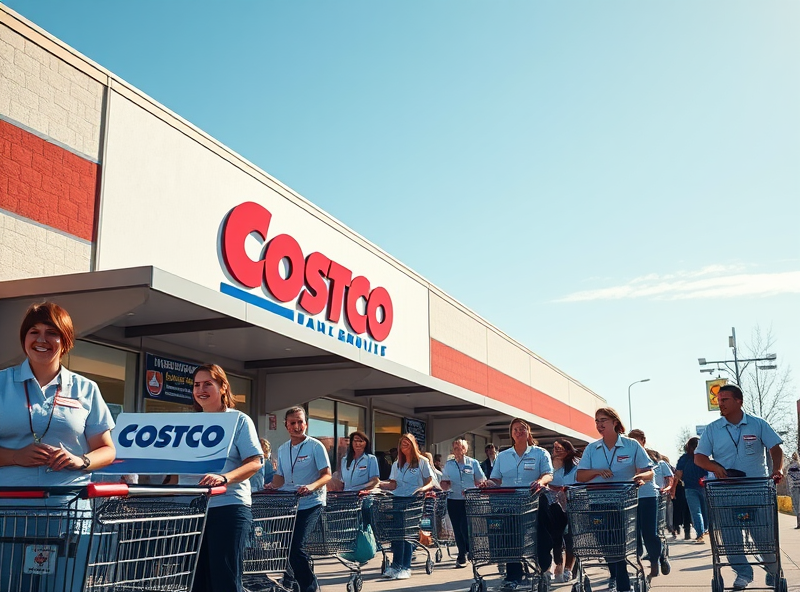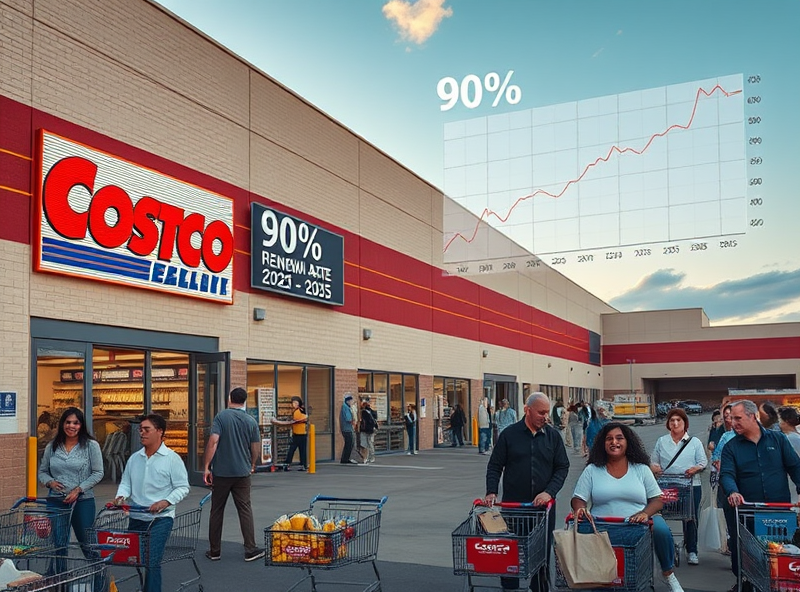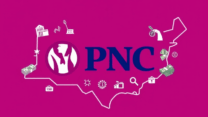
Costco Stock Forecast: How Far Can Loyalty Drive Its Growth?
Membership Model: The Heart of Costco’s Financial Success

Costco’s business model is refreshingly simple yet incredibly powerful: sell quality goods at low margins and rely on membership fees for profit. This membership-based strategy is not just a revenue stream—it’s the engine that drives customer loyalty, operational efficiency, and long-term growth.
Costco earns the majority of its profits not from product markups, but from its annual membership fees. As of 2024, Costco has over 130 million cardholders worldwide, with a renewal rate exceeding 90% in the U.S. and Canada. This high retention rate is a strong indicator of customer satisfaction and brand trust. The company offers two main membership tiers—Gold Star and Executive—with the latter providing 2% cashback on eligible purchases, incentivizing members to spend more.
This model creates a predictable and recurring revenue stream, which is highly valued by investors. It also aligns Costco’s interests with its members: the more value members perceive, the more likely they are to renew. Moreover, the steady cash flow from memberships allows Costco to reinvest in infrastructure, employee wages, and supply chain improvements, which in turn enhance the customer experience.
In times of economic uncertainty, Costco’s model shines even brighter. Consumers tend to seek value and bulk savings, which boosts traffic and sales. This was evident during the pandemic and continues amid inflationary pressures. The loyalty-driven model also insulates Costco from some of the volatility that affects traditional retailers.
For investors, this means Costco’s stock is underpinned by a stable and resilient business foundation. While its valuation may seem high compared to peers, the consistent growth in memberships and high renewal rates suggest long-term strength.
For more insights into Costco’s financials, you can refer to their official investor relations page: https://investor.costco.com/
Customer Loyalty and Employee Satisfaction as Growth Catalysts

Costco’s impressive stock performance over the years isn’t just a result of its low prices or bulk offerings—it’s deeply rooted in two often-overlooked factors: exceptional customer loyalty and high employee satisfaction. These human-centric strategies are powerful growth catalysts that help Costco maintain a competitive edge in a saturated retail market.
Costco’s membership-based model fosters a sense of exclusivity and commitment. With over 128 million cardholders worldwide, renewal rates consistently hover around 90% in the U.S. and Canada. This level of loyalty ensures a predictable revenue stream and strong customer retention, which are vital for long-term financial planning and stock stability.
Equally important is Costco’s approach to employee treatment. Unlike many competitors, Costco pays its workers significantly above minimum wage and offers comprehensive benefits. This results in lower turnover rates, higher productivity, and better customer service—factors that directly influence customer satisfaction and, by extension, brand loyalty.
Research consistently shows that companies with high employee satisfaction outperform their peers in stock performance. Costco’s strategy proves that investing in people—both customers and employees—can lead to sustainable financial growth. As consumer preferences shift toward ethical and value-driven brands, Costco’s human-first approach may continue to drive its stock upward.
For more on Costco’s financial performance and employee policies, see: https://www.forbes.com/sites/qai/2023/12/18/costco-stock-forecast-2024/?sh=4a7f8eec6f8f
Membership Model: The Heart of Costco’s Financial Success

Costco’s unique membership-based business model is the cornerstone of its long-term financial strength. Unlike traditional retailers, Costco earns a significant portion of its profits from annual membership fees rather than product markups. This model creates a stable and recurring revenue stream, which helps the company maintain low prices and high customer loyalty.
As of 2024, Costco has over 130 million cardholders globally, with a renewal rate exceeding 90% in the U.S. and Canada. This remarkable retention rate reflects not only customer satisfaction but also the trust in Costco’s value proposition. The loyalty-driven model enables Costco to operate on thin margins while still delivering consistent profitability and shareholder value.
Looking ahead to 2025 through 2035, this loyalty-based revenue stream is expected to play a pivotal role in driving stock performance. Analysts predict that as Costco expands internationally and enhances its digital infrastructure, membership growth will continue to fuel its financial momentum. Additionally, with increasing consumer focus on value and inflation-conscious shopping, Costco’s model is well-positioned to thrive.
Investors should also consider Costco’s disciplined capital allocation and conservative debt levels, which contribute to its resilience during economic downturns. Overall, the membership model is not just a revenue tool—it’s a strategic asset that underpins Costco’s long-term growth potential.
For further reading, you can refer to Costco’s official investor relations page: https://investor.costco.com/
Risks and Rewards of Investing in a Premium Valued Stock

Costco has long been a favorite among value-conscious shoppers, but for investors, it represents a different kind of value—one that comes with both high expectations and potential pitfalls. As of 2024, Costco trades at a premium valuation, with a price-to-earnings (P/E) ratio significantly higher than the retail sector average. This premium reflects investor confidence in its resilient business model, loyal membership base, and consistent revenue growth.
However, investing in a premium-valued stock like Costco comes with inherent risks. The most notable is valuation risk—paying too much for a stock can limit future returns, especially if growth slows or market sentiment shifts. In Costco’s case, even small earnings misses or macroeconomic headwinds could trigger sharp corrections.
On the reward side, Costco’s membership-based model creates a recurring revenue stream that enhances stability. Its ability to maintain low prices, even during inflationary periods, helps retain customer loyalty and supports long-term growth. Moreover, its global expansion and increasing e-commerce capabilities add to its growth potential.
For long-term investors, Costco may still be a worthwhile investment despite its premium, provided they are comfortable with short-term volatility and are focused on fundamentals. As always, diversification and a clear understanding of your risk tolerance are key when investing in high-valuation stocks.
Source: https://www.morningstar.com/stocks/xnas/cost/quote







